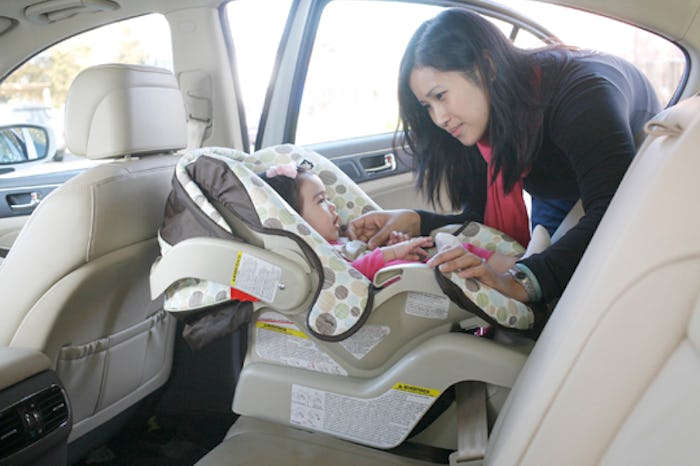Life

Babies Get Car Sick, Too: Here's How To Tell If Your Little One Is Feeling Queasy
Growing up, I loved going on family road trips. Packing up the car, looking out the window from the backseat while my dad cruised down the highway was simply the best... for me. For my car sick brother, not so much. When kids are car sick, they're miserable, and everybody knows it. But how do you know if your baby is car sick? It seems easy enough to know a child isn't feeling well, but how do babies show those signs?
As a parent whose child may to prone to car sickness, you may be wondering what causes kids to get queasy in the first place. "Motion sickness occurs with, as the [term] implies, motion," pediatrician Syeda Amna Husain tells Romper.
"There are delicate bones and structures in the inner ear which sense balance and coordination. In a moving car, the brain feels conflicting signals of sitting still, yet the inner ear is processing movement."
Motion sickness doesn't only happen in the car though. Husain says motion sickness can happen on "a plane, train, bus" or even when a kid is spinning in circles. I'm sure many of us can remember a time where we felt ill while doing any of the above activities, but not everyone is affected.
Dr. Gul Manalai of St. Joseph Medical Center in Maryland tells Romper that "In children, motion sickness is more common in between the ages of 3 to 12," an age where children can more readily tell you how they're feeling and can effectively express when they're feeling unwell. But what if your baby is feeling car sick and can't yet communicate it?
"Usually babies who suffer from car sickness are fussy in the car and then end up vomiting. Once the car ride is over, they tend to feel better and act normal again," Dr. Danelle Fisher, a pediatrician and vice chair of pediatrics at Providence Saint John's Health Center in Santa Monica, California tells Romper.
Husain elaborates, saying "[Babies] may feel restless or appear pale. He or she may even lose interest in food, even their favorite foods."
If you're certain that your baby is susceptible to getting motion sickness, there may be some things you can do to make their trip (and yours) more pleasant. Husain suggests trying "a few light snacks to alleviate hunger pains, but [ones] that don’t add feelings of heaviness before traveling. Try to distract your child with activities like songs, stickers, or toys." Many parents think that allowing their child to watch movies or stare at a screen while in the car can help alleviate motion sickness, but Husain says it's actually the opposite. "Looking at things outside the car further away, such as trees or cars passing by instead of stationary books or handheld games, seems to work better," she explains.
Other non-medication strategies include "gradually exposing your little one to motion. A little at a time helps get the child used to the rhythm of the motion," says Manalai. You may also want to make sure they have a good line of vision and plenty of fresh air. "The fresh air and view of the horizon help to minimize discomfort, and the outside focus can provide a healthy distraction," Manalai says. Also, positioning the car seat so your child can look forward may help, as long as it's safe to do so (not the case with babies, of course).
"Reclining their head back 30 degrees or so also helps reduce feelings of nausea and discomfort," Manalai adds. Other supportive techniques include mindful breathing, teaching your child to take deep breaths, and controlled breathing to suppress symptoms of feeling car sick.
If you're a parent who needs more intervention, there are other things you can do to help your child in the car, such as a cool cloth on the forehead. You may also want to avoid giving your child any spicy or acidic foods and caffeine, including chocolate, while in the car or just before, and stick to bland, high carb snacks, as per Dr. Manalai.
Parents may also want to try and travel shorter distances to help avoid motion sickness. However, if the distance you're traveling is long and unavoidable, Dr. Fisher says, "try not to give the baby a bottle or breast feed right before going in the car."
If all else fails, talk to your doctor to make sure what your child is experiencing is actually motion sickness. Plus, there may be other medical options for your child when it comes to treating car sickness symptoms, so be sure to check with your pediatrician so you can decide what's right for your child.
Experts:
Syeda Amna Husain, M.D., is the founder of Pure Direct Pediatrics
Gul Manalai, M.D. of St. Joseph Medical Center in Maryland
Danelle Fisher, M.D., vice chair of pediatrics at Providence Saint John's Health Center